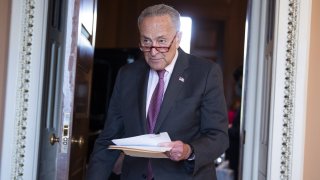
- The Senate has reached a deal to avoid a government shutdown, Majority Leader Chuck Schumer said late Wednesday.
- The legislation would fund the government into early December and provide money for hurricane relief and Afghan refugee resettlement, he said.
- Congress has to pass a funding bill before midnight Thursday to avoid a shutdown.
- Lawmakers will have to separately raise the U.S. debt ceiling before Oct. 18 to prevent a first-ever default.

The Senate has reached a deal to avoid a government shutdown, Majority Leader Chuck Schumer said late Wednesday.
The New York Democrat said he has scheduled a vote on the stopgap measure for Thursday morning. The bill would keep the government running into early December, according to Schumer. The deal would still need to pass the House.
We've got the news you need to know to start your day. Sign up for the First & 4Most morning newsletter — delivered to your inbox daily. >Sign up here.
Federal funding will lapse if Congress fails to pass an appropriations plan before midnight Thursday.
The proposal would also include money for hurricane relief and Afghan refugee resettlement.
Money Report
"We can approve this measure quickly and send it to the House so it can reach the president's desk before funding expires midnight tomorrow," Schumer said earlier Wednesday. "With so many critical issues to address, the last thing the American people need right now is a government shutdown."
A lapse in funding could lead to federal worker furloughs and a reduction in services. The Biden administration's Office of Management and Budget has sent shutdown guidance to agencies ahead of the funding deadline.
If lawmakers can keep the government running, they will only prevent one looming crisis. Treasury Secretary Janet Yellen has told Congress the U.S. will run out of ways to pay its bills around Oct. 18 if lawmakers do not hike or suspend the debt limit — raising the prospect of a first-ever default that could wreck the U.S. economy.
Government funding and the debt ceiling are separate issues. Raising the borrowing limit does not authorize future spending and allows the Treasury to cover its current obligations.
Democrats, who control both chambers of Congress, tried to head off both crises in one swoop this week. The House passed a bill that would fund the government and suspend the debt ceiling, but Republicans blocked it in the Senate on Monday. The GOP has opposed efforts to raise the debt limit.
Once Congress approves an appropriations bill, Democrats will have to find a way to avoid default on their own. On Tuesday, Republicans — who appear set on boxing their counterparts into increasing the ceiling as part of their massive investment in social programs and climate policy — blocked a motion that would have allowed Democrats to hike the debt limit with a simple majority vote.
Schumer on Wednesday said trying to raise the ceiling through the budget reconciliation process would put Congress in "uncharted waters."
"It is very risky and could well lead us to default even if only one senator wanted that to happen," he said. "So you can't do it through this route."
— CNBC's Christine Wang contributed to this report.






